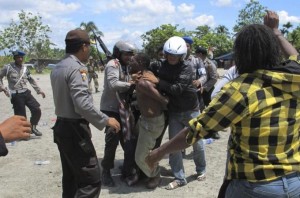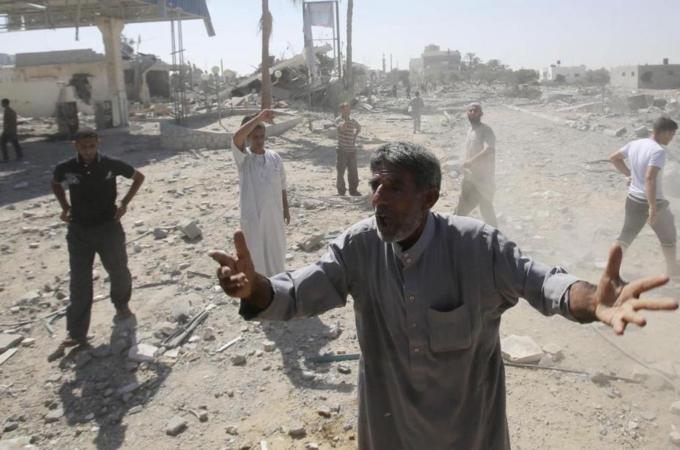West Papuan Independence Movement Struggles Against Long Lasting Indonesian Control
by Max Bartels
Impunity Watch Reporter, Oceania
Manokwari, West Papua
West Papua is the western half of the of the Island of New Guinea, the other half being the nation of Papua New Guinea. West Papua has been under the control of the Indonesian government since the late 1960s when a vote mandated by the U.N ended in a sham where only a handful of the indigenous population were allowed to vote. As a result of the vote the province remained in the hands of the Indonesian government against the will of the majority of the local population.

(Photo curtesy of Aljazeera)
The West Papuan Independence movement has since had the goal of expelling Indonesian occupation from West Papua. There have been many similar incidents over the years but the most recent was in April. There was a shooting near the border with Papua New Guinea where the resistance fighters shot an Indonesian border guard and set a car wash on fire. The resistance fighters raised the flag of West Papua as a symbol of resistance.
There seems to be a split amongst West Papuan leaders on the best approach to achieve their goals. Some support the actions of the independence movement, most of these leaders now live in a exile in countries and islands around the South Pacific. Other leaders, mainly those in the West Papuan congress believe that it is better to work with the Indonesian government to achieve a better standard of living within the province.
In February the Guardian reported an incident in a West Papuan village where the Indonesian military and police woke up the locals at 3am and shuffled all the families into the town square to be questioned for their involvement in the resistance movement. Many people were interrogated with guns held to their heads, others were arrested and beaten and some families were forced to burn down their own homes.
The resistance movement has a lack of outside international support. While it has been reported that the Indonesian government has committed many human rights offenses to the indigenous population of West Papua, the Indonesian government still has the support of the Australian government. Indonesia is an import political ally for Australia and therefore Australia has not been unwilling to support the movement. West Papuan exiles have also been denied entry into Australia.
Recently two French journalists attempted to enter West Papua in an attempt to film a documentary on the resistance movement. Both were arrested for visa violations, France and the U.S have appealed to Indonesia to lessen their restrictions on journalism in West Papua.
For more information, please see:
The Guardian — West Papuan Independence Fighters Injure Two in Border Shooting — 8 April 2014
The Guardian — West Papuan Independence Movement- a History — 28 August 2013
United Nations Announces Panel to Probe War Crimes Allegations in Gaza
By Kathryn Maureen Ryan
Impunity Watch Reporter, Managing Editor
Gaza City, Gaza – The United Nations Human Right Council has named three experts to an international commission of inquiry into possible human rights violations and war crimes committed by both the Israeli government and Hamas during Israel’s military offensive in the Gaza Strip. The U.N. statement announcing the formation of the panel said the independent team will investigate “all violations of international humanitarian law and international human rights law” in the context of the military operations that have been conducted since 13 June 2014.

William Schabas, a Canadian professor of international law was appointed to lead the panel. Critics have called Schabas anti-Israel and have complained that his leadership may lead to a bias investigation. Schabas has reportedly made several statements criticizing Israel leadership in the past and once declared, “My favorite would be Netanyahu within the dock of the International Criminal Court.” However, Schabas has written off critics saying that any suggestion that he is somehow anti-Israel is absurd. He said, “I have opinions like everybody else about the situation in Israel,” he said. “They may not be the same as Hillel Neurer’s [head of the Geneva based group U.N. Watch] or Benjamin Netanyahu’s, that’s all.”
The other members of the panel included Doudou Diene, a Senegalese veteran U.N. human rights expert and Amal Alamuddin, a British-Lebanese lawyer engaged to actor George Clooney. However, Alamuddin has denied that she would participate in the inquiry and it is not yet known who will replace her.
Navi Pillay, the United Nations High Commissioner for Human Rights said on July 31 that she believed that the Israel government was deliberately defying international law in its military offensive against Hamas in Gaza. She also said that she believes world powers should hold Israel accountable for these violations.
So far the Israeli military has attacked schools, hospitals and homes as well as Gaza’s only power plan, which provides critical energy to the regions civilian population. Hamas militants in Gaza have also violated human rights by firing rockets indiscriminately into Israel territory, Pillay said.
The Israel government has dismissed the inquiry led by the Human Rights Council as a “kangaroo court.” In a statement, Israeli Foreign Ministry spokesman Yigal Palmor issued a statement dismissing the UN inquiry. He stated that in the view of the Israeli government the “the Human Rights Council had long ago turned into the ‘terrorist rights council’ and a kangaroo court, whose ‘investigations’ are pre-determined.”
Hamas Spokesman Sami Abu Zuhri in Gaza said that “Hamas welcomes the decision to form an investigation committee into the war crimes committed by the occupation against Gaza and it urges that it begin work as soon as possible.”
The armed-conflict in Gaza has killed 1,938A Palestinians and 67 Israelis and has devastated large tracks in the densely populated Gaza Strip, damaging civilian property and leaving thousands of Palestinian Civilians displaced.
For more information please see:
The New York Times – Israel Braces For War Crimes Inquiries on Gaza – 14 August 2014
Al Jazeera – UN Names Gaza War Crimes Probe Panel – 12 August 2014
Israel National News – UN Gaza Probe Head: Me? Anti-Israel? – 12 August 2014
Reuters – U.N. Names Panel To Probe War Crimes in Gaza; Israel Slams It – 12 August 2014
Growing Concerns Over ISIS Lead France to Question Whether European Involvement is Necessary
By Kyle Herda
Impunity Watch Reporter, Europe
PARIS, France – The United States began a series of airstrikes in Iraq this week in an attempt to assist resistance against the Islamic State in Iraq and Greater Syria (“ISIS”), leading Europe to question whether to get involved, and if so, how involvement should be done.

On Monday, France called a meeting of European Union foreign affairs in order to determine what should be done about the Middle East. ISIS is spreading and growing at a rapid pace, and European nations are worried that if left alone, turmoil in the Middle East could become a global threat. ISIS fighting has already spread throughout the nations of Lebanon, Syria, Iraq, and has caused massive disturbances.
The fears of a possible Christian genocide by ISIS has led to a huge fleeing of Christians from the region, leaving areas like Mosul completely free of Christians. In an attempt to mitigate the number of Christians killed, France has helped facilitate asylum for those in Iraq fleeing ISIS.
French Foreign Minister Laurent Fabius believes that the way to counter ISIS is to give the Kurds in Iraq “equipment that will allow them to defend themselves and to counterattack.” Italian Foreign Minister Federica Mogherini further said the goal is “providing support, even of a military sort, to the Kurdish government.”
One problem, however, is that France is already committed militarily to Africa. France further believes that the United States is better suited to fight ISIS in Iraq and help support the Kurds. France, on the other hand, is better suited to support Lebanon in the fight against ISIS, as France has close ties with the Lebanese army and trains Lebanese officers. It is also believed that weapons held by the Lebanese army would be less likely to fall into the hands of the enemy.
After allowing the fight in Syria to develop over three years into the large catastrophe that it is now, concerns loom over whether an early intervention now is necessary to prevent a larger ordeal in the future with ISIS. However, NATO has recently declared it a “high probability” that Russia will militarily intervene in Eastern Ukraine under the guise of a “humanitarian aid.” 45,000 Russian troops are currently aligned on the joint border with Ukraine, having amassed as Kiev pushes further east and nears the larger pro-Russian held cities like Donetsk. With a possible invasion of a European nation looking more and more possible by the day, the EU will certainly be cautious to invest militarily to any outside conflicts just in case help is needed at home.
For more information, please see:
Arab News – France asks EU to arm Kurds in Iraq – 12 August 2014
Vice News – Europe Is Still Pondering What to Do in Iraq – 11 August 2014
Reuters – Russia sending aid convoy to Ukraine despite Western warnings of ‘invasion pretext’ – 11 August 2014
France 24 – French military effort against ISIS ‘should focus on Lebanon’ – 11 August 2014
France 24 – Iraq’s fleeing Christians rebuild shattered lives in France – 10 August 2014
Ferguson, Missouri Protests Infringe on Constitutional Rights
By Lyndsey Kelly
Impunity Watch Reporter, North America
WASHINGTON D.C., United States of America – On the fourth night proceeding the fatal shooting of a Missouri teenager, Michael Brown, what community members considered mostly peaceful protests were met with extreme police violence. The protests began after Brown was shot and killed by a local police officer.

The police violence came in the form of tear gas, rubber bullets, heavily armed SWAT teams and mine-resistant vehicles. Reports indicate that the police force zeroed in on a mostly peaceful protest in Ferguson, Missouri, where protesters were seen symbolically holding their hands in the air, the same gesture Brown was believed to be doing when he was shot by an unidentified officer. In an effort to disperse the crowd of protestors, a group of at least 70 armed SWAT officers fired smoke bombs so regularly that it made it difficult to breath.
The racially charged protests in Ferguson, which have resulted in a military-style police crackdown, resulted in the arrests of numerous demonstrators and at least two journalists. A news crew from the TV network Al Jazeera America reported that tear gas and rubber bullets were fired in the proximity of the crew, and later released a statement expressing the incident’s impact on constitutional rights, “Al Jazeera is stunned by this egregious assault on freedom of the press that was clearly intended to have a chilling effect on our ability to cover this important story.”
President Barack Obama made his first statement regarding the protests on Thursday, 14 August, condemning the violent tactics used on both sides of the ongoing protests. Obama acknowledged the constitutional issues with the police crackdown, stating, “There’s…no excuse for police to use excessive force against peaceful protests or to throw protestors in jail for lawfully exercising their First Amendment rights,” he continued by stating, ”Here in the United States of America, police should not be bullying or arresting journalists who are just trying to do their jobs and report to the American people on what they see….” The President also acknowledged that those demonstrators whom engaged in violence against the police, specifically those who were said to have thrown rocks and Molotov cocktails, and used this time of unrest as an excuse for violence, vandalism, and looting were equally as wrong as the police.
Obama concluded by calling for a calm in Ferguson, Missouri, saying that now is not the time for unrest, instead it is time for an, “open and transparent process to make sure that justice is done.”
For more information, please see the following:
BUSINESS INSIDER – Obama: There’s ‘No Excuse’ For Police To Use Excessive Force In Ferguson – 14 August 2014.
HUFFINGTON POST – Obama On Ferguson: ‘ No Excuse For Police To Use Excessive Force – 14 August 2014.
HUFFINGTON POST – Ferguson Protests Met With Heavy Police Response, 2 Reporters And Alderman Arrested – 14 August 2014.
NBC NEWS – “No Excuse’: Obama Expressed Concern About Violence In Missouri – 14 August 2014.